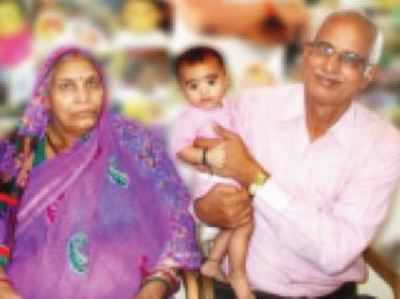After losing 31-year-old son, woman delivers healthy baby boy at 64
- Home
- News & Media
- After losing 31-year-old son, woman delivers healthy baby boy at 64
The Delhi-based couple opted for in vitro fertilisation (IVF) and Chameli Meena delivered a healthy baby boy in March this year, at age 64.
The IVF expert said the couples who opt for IVF after the age of 50 are mostly those who have lost a child in an accident or other incident.

Chameli Meena, Jagdish Meena with their son Armaan.
NEW DELHI: The Meenas, devastated and lonely after the sudden death of their 31-year-old son in 2015, didn't lose hope. The Delhi-based couple opted for in vitro fertilisation (IVF) and Chameli Meena delivered a healthy baby boy in March this year, at age 64.
The father, Jagdish Meena, 65, who retired from a top public sector company in 2012, is the proud father, and Armaan is the appropriately named baby. "We undergo health check-ups every six months to keep ourselves healthy and available to the child through his growing years," Jagdish Meena told TOI when asked about fathering a baby in his mid-60s.
The Meenas are not the only such couple. Dr Anoop Gupta, director of the Delhi IVF and Fertility Centre where Chameli underwent IVF treatment, told TOI they had conducted the procedure on at least 20-25 women aged above 50 in the last five years.
If the mother is healthy and she can undergo the procedure, how can we deny her the right to opt for assistive reproductive technology? Also, we cross-check the financial situation of such couples before agreeing to conduct the procedure," he added.
The IVF expert said the couples who opt for IVF after the age of 50 are mostly those who have lost a child in an accident or other incident. "We also came across one couple who had never thought of having a baby, till they retired. When they retired, they felt lonely and sought to undergo the assistive childbirth procedure," Dr Gupta said.
Last year, a 72-year-old woman from Punjab gave birth to healthy boy at Haryana's National Fertility Centre, aworld record. On the centre's website are several cases of women above 60 years of age delivering babies through IVF technology. While success in such cases brings a bundle of joy, many doctors ask about the future of these children.
"By the time the children are in their 20s, the parents may die or become too old to care for them," said Dr Kamini Rao, founder of Milann IVF, adding they do not entertain requests for IVF from couples over the age of 50. Dr Anju Yadav, consultant at Bourn Hall Clinic, too, said they don't entertain couples beyond a certain age. IVF is a process by which egg cells are fertilised by sperm outside the human body. The fertilised egg is then transferred into the patient's uterus with the aim of establishing a successful pregnancy.
Fertility experts say the human body is not supposed to reproduce at 50. "Usually, menopause sets in at 40-45 itself. But many clinics conduct IVF by reviving the uterus through hormone replacement therapy and using eggs donated by someone else and sperm from the husband," said a doctor. Dr Abha Mazumdar, an IVF expert at Sir Ganga Ram Hospital, said the risk of maternal mortality is very high among older women undergoing IVF. "Many women may say they would take that risk.
But then, we must also ask about the future of the child born thus. Is it ethical to help couples old enough to be grandparents to have a baby through IVF," she said. Dr Mazumdar said there is no law in India to regulate fertility clinics. "The Indian Council for Medical Research (ICMR) has issued guidelines for fertility clinics but they are not binding.
Also, it has failed to put a cap on the maximum age for IVF," the doctor said. Diabetes, hypertension, and other lifestyle diseases are common among women in the age group of 40-50. As they grow older, this can make them morbid and unfit to undertake the responsibilities of caring for a growing child.
